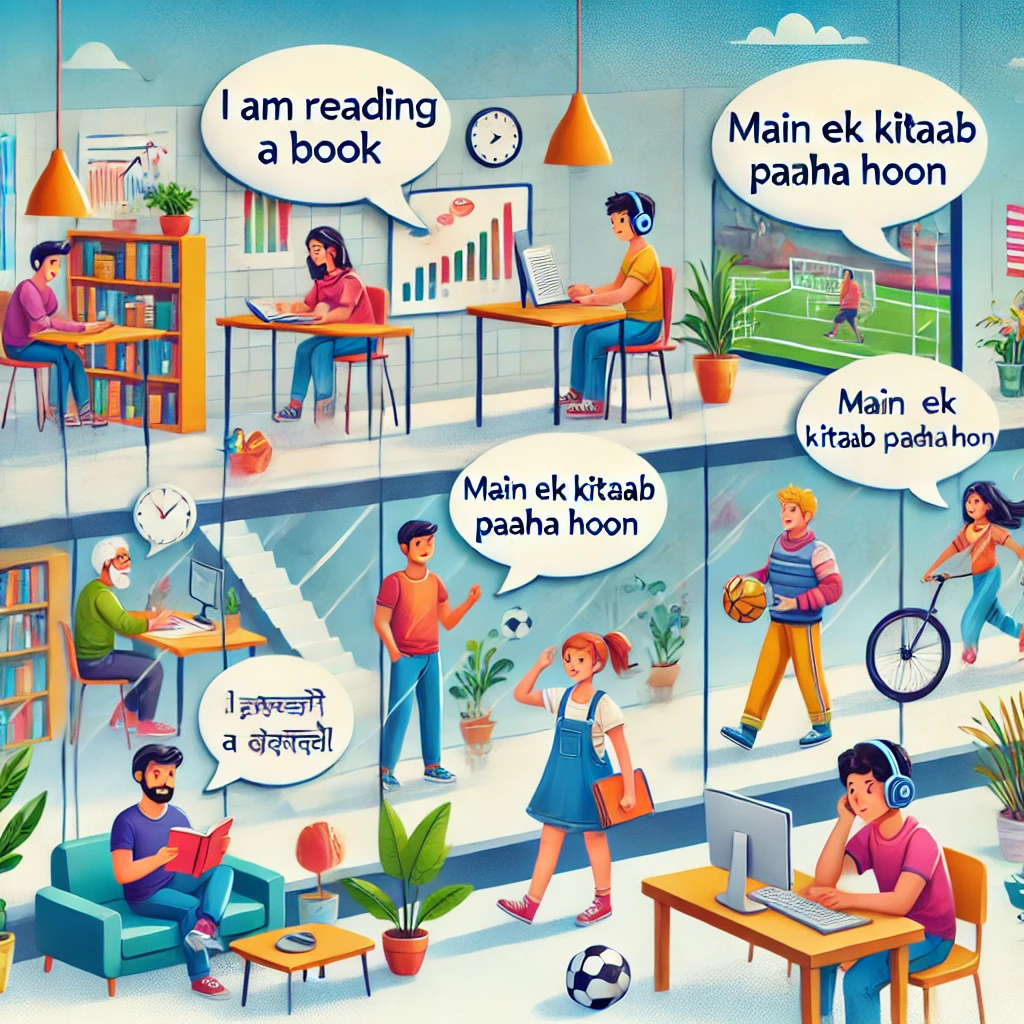Brief Explanation (Hindi):
पन्द्रह सालों से ग्रामीण बच्चों को अंग्रेज़ी पढ़ाते हुए मैंने पाया है कि Present Perfect Continuous Tense (हो रहा है/रहा है/रही है) को समझने में कई बार मुश्किलें आती हैं। हिंदी में "रहा है/रही है" का प्रयोग अक्सर Present Continuous (हो रहा है) और Present Perfect Continuous (होता आ रहा है) दोनों के लिए होता है। यही भ्रम की जड़ है। उदाहरण के लिए, "मैं खाना खा रहा हूँ" Present Continuous है जबकि "मैं दो घंटे से खाना खा रहा हूँ" Present Perfect Continuous है। बच्चों को "से" (since) और "तक" (for) जैसे शब्दों का अर्थ और उनका Present Perfect Continuous में उपयोग समझने में दिक्कत होती है। वह "I have been playing cricket." को "मैं क्रिकेट खेल रहा हूँ" ही समझते हैं, समय की अवधि को नहीं। इसके अलावा, अनियमित क्रियाओं के साथ Present Perfect Continuous का प्रयोग और भी पेचीदा हो जाता है। इसलिए, सादे उदाहरणों और रोज़मर्रा की स्थितियों से इस tense को समझाना ज़रूरी है।
Brief Explanation (English):
In my fifteen years of teaching English to rural Indian children, I've observed consistent challenges with understanding the Present Perfect Continuous tense. The Hindi equivalents of " रहा है/रही है" often blur the lines between Present Continuous and Present Perfect Continuous, creating confusion. For instance, "मैं खाना खा रहा हूँ" (Main khana kha raha hoon) translates to both "I am eating" (Present Continuous) and "I have been eating" (Present Perfect Continuous) depending on context. Students struggle to grasp the nuances of words like "से" (since) and "तक" (for) and their crucial role in indicating duration within the Present Perfect Continuous. They might interpret "I have been playing cricket" as simply "I am playing cricket," failing to recognize the ongoing duration. Irregular verbs further complicate matters. Thus, clear, relatable examples grounded in everyday situations are key to effective teaching.
| English | Hindi | Roman Hindi |
|---|---|---|
| I have been studying all day. | मैं सारा दिन पढ़ता आ रहा हूँ। | Main saara din padhta aa raha hoon. |
| She has been waiting for hours. | वह घंटों से इंतज़ार कर रही है। | Wah ghanto se intezaar kar rahi hai. |
| They have been playing since morning. | वे सुबह से खेल रहे हैं। | Ve subah se khel rahe hain. |
| We have been working on this project for weeks. | हम इस प्रोजेक्ट पर हफ़्तों से काम कर रहे हैं। | Hum is project par hafto se kaam kar rahe hain. |
| He has been singing all evening. | वह पूरी शाम गाता आ रहा है। | Wah puri sham gaata aa raha hai. |
| The children have been playing in the garden. | बच्चे बगीचे में खेल रहे हैं। | Bachche bagiche mein khel rahe hain. |
| The dog has been barking all night. | कुत्ता सारी रात भौंकता रहा है। | Kutta saari raat bhaunkta raha hai. |
| It has been raining for three days. | तीन दिनों से बारिश हो रही है। | Teen dino se baarish ho rahi hai. |
| I have been trying to call you. | मैं तुम्हें फोन करने की कोशिश करता आ रहा हूँ। | Main tumhen phone karne ki koshish karta aa raha hoon. |
| They have been learning English for years. | वे सालों से अंग्रेजी सीख रहे हैं। | Ve saalon se angrezi sikh rahe hain. |


